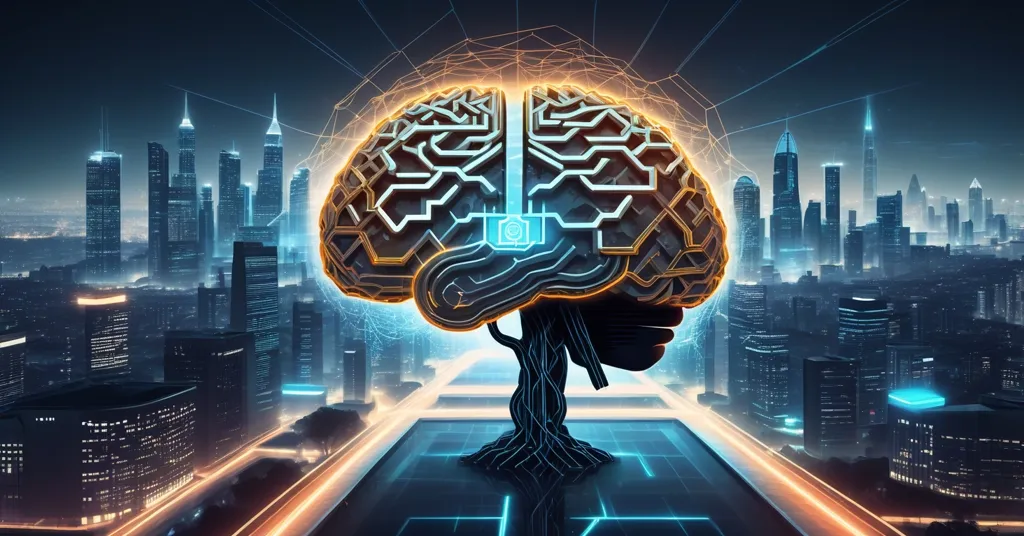Sam Altman’s GPT-5: $100B AI Revolution Meets Crypto Potential and Pitfalls

Sam Altman’s GPT-5 Hype: A $100 Billion AI Revolution with Crypto Crossroads?
Sam Altman, CEO of OpenAI, has unleashed ChatGPT-5 with claims that it could save lives, transform industries, and build a $100 billion enterprise AI juggernaut. But as advocates of decentralization and disruptive tech, we’re asking: is this a true leap forward, or another Big Tech overpromise? And could it intersect with the crypto revolution we’re championing?
- ChatGPT-5 Unveiled: Touted as a PhD-level expert, promising breakthroughs in healthcare, finance, and more.
- Big Money Dreams: Altman predicts a $100 billion business line from enterprise AI tools.
- Double-Edged Sword: Life-saving potential clashes with risks of errors, job losses, and centralized control—where does crypto fit?
GPT-5’s Bold Promises: Healthcare and Beyond
OpenAI’s latest brainchild, ChatGPT-5, has landed with fanfare, positioned by Altman as a tool with near-academic expertise capable of shaking up sectors like healthcare, finance, engineering, and software development. In healthcare especially, Altman envisions it as a virtual physician assistant, aiding doctors with diagnostics and critical decisions—potentially a lifeline in understaffed or resource-scarce settings. OpenAI’s own data backs this ambition, with GPT-5 scoring highest on HealthBench, a benchmark crafted with 250 physicians to simulate real-world medical tasks. For more on Altman’s vision for healthcare, check out his bold claims about GPT-5’s life-saving potential.
“You can imagine, like a physician assistant, that a company could build with GPT-5. That would really potentially save a lot of lives.” – Sam Altman
But let’s not get carried away with the heroics just yet. While the potential is staggering, healthcare is a high-stakes arena where errors aren’t just glitches—they’re life-or-death. Microsoft CTO Harjinder Sandhu has sounded the alarm on AI “hallucinations,” where models confidently spit out false or fabricated info. Imagine GPT-5 misdiagnosing a condition or omitting critical patient data; Sandhu warns such mistakes could have “catastrophic consequences.” For those new to the term, AI hallucinations are like a confident liar in a lab coat—dangerous when trusted blindly. So while partnerships with firms like Amgen for drug design and Oscar Health for clinical reasoning show promise, the risks are a glaring counterpoint to Altman’s optimism. To dive deeper into these concerns, see this fact check on GPT-5’s healthcare applications.
The $100 Billion Bet: Enterprise AI Economics
Beyond saving lives, Altman’s got a grander vision: turning OpenAI into a $100 billion enterprise AI empire by selling tools like GPT-5 to businesses. Early testers, including developers, report productivity jumps of two to five times their usual output, especially for repetitive tasks like data entry or coding grunt work. Picture personalized AI assistants handling the mundane, freeing up human brainpower for bigger ideas—that’s the pitch, and it’s a seductive one for industries bogged down by inefficiency. For a closer look at these possibilities, explore the enterprise potential and risks of GPT-5.
“I think a company like OpenAI will be able to build a $100 billion business line, just selling products to other businesses.” – Sam Altman
Let’s talk cold, hard cash. OpenAI priced GPT-5’s API—essentially a way for developers to plug the AI’s smarts into their apps—at $1.25 per million input tokens and $10 per million output tokens, with cached inputs at a measly $0.125. For context, tokens are chunks of text the AI processes; roughly 750 words equal 1,000 tokens. This pricing matches Google’s Gemini 2.5 Pro at base tiers and slashes costs compared to Anthropic’s Claude Opus 4.1, which runs a steep $15 input and $75 output per million tokens. Developers like Simon Willison have called it “aggressively competitive,” while Matt Shumer of HyperWrite noted it’s cheaper than OpenAI’s own GPT-4o, saying “intelligence per dollar continues to increase.” For a small crypto startup, this could mean automating market analysis for pocket change daily—game-changing if it holds up. Access is live for ChatGPT Plus, Pro, and Team subscribers, with Enterprise and Education plans rolling out soon. If this sparks an AI price war, we’re all for the chaos—lower costs could democratize tech, a win for disruption.
Cracks in the Code: Performance Gaps and Rivals
Altman’s not shy, labeling GPT-5 “the best model in the world.” But hold the champagne—benchmarks tell a less flattering story. While it shines in healthcare-specific tasks, GPT-5 only narrowly edges out competitors like Anthropic’s Claude 4 and Google DeepMind’s Gemini 2.5 Pro in some areas, lagging in others like reasoning and factual accuracy. Claude, for instance, dominates with a 200K-token context window—meaning it can “remember” massive amounts of data in one go, ideal for complex queries or long documents. Think of it as the AI’s short-term memory; bigger is often better, and GPT-5 isn’t the champ here. Gemini also takes the lead in reasoning tasks, raising doubts about Altman’s sweeping claim. Don’t buy the hype just yet—this isn’t the flawless savior it’s painted as. For a detailed comparison, see this benchmark analysis of GPT-5 against rivals.
“the best model in the world.” – Sam Altman
Open-Source or Open Season? Community Backlash
In a surprising pivot, OpenAI dropped two open-source models, gpt-oss-120b and gpt-oss-20b, their first open-weight releases since 2019. For the uninitiated, open-source means the model’s guts—its code or weights—are public, letting developers tweak or build on them freely. It’s a nod to transparency, maybe even a whiff of decentralization. But the crypto and tech communities aren’t sending thank-you cards. Feedback on platforms like Reddit’s r/LocalLLaMA is savage, with users slamming these models for lousy performance, high hallucination rates, and overzealous censorship compared to alternatives like Llama 4 or DeepSeek V3. OpenAI’s open-source gamble flopped hard, and the crowd isn’t holding back with the burns. If this was meant to win hearts, it’s more like a public roast. For community reactions, take a look at these Reddit discussions on GPT-OSS models.
Workforce Woes: Disruption’s Dark Side
Let’s tackle the elephant in the room: jobs. Altman’s bullish on long-term job creation, forecasting entirely new roles that “weren’t even possible to think about before AI.” Fair enough—tech often births unexpected gigs. But he admits short-term pain is real, as automation targets repetitive roles in data entry, customer service, and beyond. It’s the classic tech disruption tale—progress for the innovators, pink slips for the rest. Regulatory scrutiny is heating up too, with governments eyeing AI’s impact on employment and privacy. For us in the crypto space, this mirrors Bitcoin’s own upheaval of traditional finance jobs. The question is whether society nets a gain or just trades one grind for another. To explore more on how GPT-5 stacks up in this debate, check out this comparison of AI models on Quora.
“There will be totally new things that just didn’t exist, they weren’t even possible to think about before AI.” – Sam Altman
AI Meets Crypto: Synergy or Showdown?
As champions of decentralization, we’re digging into how GPT-5 and AI at large could mesh with the crypto revolution—or clash with it. OpenAI’s centralized model raises red flags for us Bitcoin maximalists. Big Tech’s grip on AI feels like the antithesis of permissionless innovation, but there’s untapped potential here. Imagine decentralized AI running on blockchain for verifiable data integrity—crucial in healthcare for tamper-proof patient records or in enterprise for transparent workflows. Ethereum’s smart contracts could secure access to AI APIs, while Bitcoin’s Lightning Network might enable microtransactions for AI services, like paying a few sats for a quick market analysis. These are niches Bitcoin itself doesn’t fill, but altcoins and protocols like Solana could step up, blending financial rebellion with AI firepower. For insights into this crossover, see this exploration of AI and cryptocurrency integration possibilities.
Even OpenAI’s open-source flop could be a stepping stone. If refined, such models might align with decentralization’s ethos—think community-run AI on distributed networks, free from corporate overreach. Or consider tokenized AI economies, where crypto fuels API access or rewards contributions to model training. Projects in the crypto space are already tinkering with such ideas, and while OpenAI isn’t explicitly playing in this sandbox, the overlap is a wild frontier. Centralized AI giants like OpenAI might never fully embrace our ethos, or are we just pawns in their profit game? It’s a tension worth wrestling with. For community perspectives on this, check out this Reddit thread on GPT-5’s impact in healthcare and beyond.
Key Takeaways and Questions to Ponder
- What’s the big deal with GPT-5 in healthcare?
Its PhD-level expertise could act as a physician assistant, aiding diagnostics and potentially saving lives, though risks like AI hallucinations—spouting false info—could be catastrophic. - Is Altman’s $100 billion AI empire realistic?
It’s a bold vision reflecting huge enterprise demand for AI tools, but without hard revenue numbers, it’s just a shiny forecast for now. - How does GPT-5 measure up against AI rivals?
It excels in niche areas like healthcare tasks but stumbles in reasoning and context handling compared to Gemini 2.5 Pro and Claude 4, undercutting claims of supremacy. - Why the backlash to OpenAI’s open-source models?
Models like gpt-oss-120b flopped with poor performance and censorship issues per community feedback, showing even “free” doesn’t guarantee value or align with decentralization ideals. - Can AI like GPT-5 fuel the crypto revolution?
Absolutely—decentralized AI on blockchain could ensure data integrity, while tokenized economies or microtransactions via Bitcoin or Ethereum might power AI access, carving disruptive niches.
So, where do we land on GPT-5? It’s a heavy hitter with holes in its armor—pricing that could shake markets, healthcare potential that might save lives, but performance gaps and real risks that can’t be ignored. Workforce disruption looms large, and OpenAI’s open-source misstep shows even giants can stumble. As decentralization diehards, we’re intrigued by AI-blockchain synergies but wary of centralized control. GPT-5 could be a cornerstone of tomorrow’s tech or a cautionary tale of hype outpacing reality. Only raw, real-world results will settle the score. For now, we’re rooting for disruption—whether it’s Altman’s AI or our crypto rebellion—that genuinely flips the status quo on its head. For additional details on GPT-5’s capabilities, take a look at this comprehensive wiki on ChatGPT-5 features.



